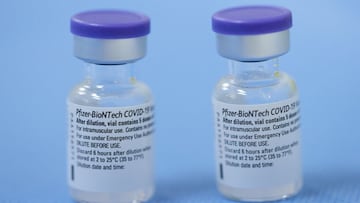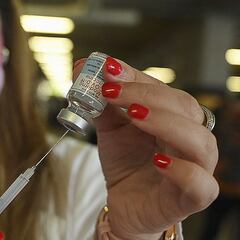Do experts believe the Pfizer vaccine is less effective against the Delta variant?
Pharmaceutical companies are pushing for a booster jab in the Autumn due to the Delta variant causing a surge in covid-19 cases.


What risk does the Delta variant pose?
The variant has a high viral load, meaning people can become infected after a shorter contact with someone already infected. It is estimated that the viral load of Delta is 1260 times more than variants from the beginning of the pandemic. Health guidance says there is a risk of infection even with people outdoors for no more than five minutes, and that even people vaccinated should wear masks indoors. The CDC also states that Delta is twice as contagious as the Alpha variant first sequenced in the UK, which was itself twice as infectious as the original covid-19 strain.
What this means in practice is rising hospitalizations and deaths. Data from the week beginning July 28 shows nationwide hospitalizations rose by 40% from the week prior, to a seven-day average of 7,707. Hospitalizations have been rising since late June, and are at their steepest rise since November 2020.
Related stories
- Are all vaccines effective against the Lambda variant?
- What is the percentage of deaths among vaccinated people according to the CDC?
- How many covid-19 variants are there currently in the US?
- Why are covid-19 hospitalizations increasing?
Is the Pfizer vaccine less effective?
Israeli officials released a statement in July claiming that the Pfizer-BioNTech vaccine offers just 64% protection against the Delta variant, significantly lower than the 95% coverage that was initially reported. The Moderna and the Pfizer-BioNTech vaccinations were both developed using the same mRNA technology, suggesting that Moderna may suffer a similar drop-off against the Delta strain.
And the Mayo Clinic recently published a pre-paper which suggest the Pfizer vaccine may not be as good at preventing Delta variant infection. In January, it had an effectiveness of 85%, by July, when Delta was the dominant strain, the efficacy had dropped to 42%. Over the same period, the Moderna vaccine only dropped to 76%. In total, the study used testing data of 37,573 recipients of the Pfizer vaccine and 35,902 of Moderna. While acknowledging it still protected against severe illness, the study says further testing should be done how to make the vaccines more effective.
There are now 5 mRNA vaccine effectiveness studies for preventing Delta infections, and more on the way. Except for @PHE_UK, all show a marked reduction, particularly for @Pfizer, but the @moderna_tx comparison is confounded by its later administration (less chance to see waning) pic.twitter.com/lKzR1UvOpl
— Eric Topol (@EricTopol) August 12, 2021
When is it receiving full FDA approval?
All the current vaccines in use in the US are classified for 'emergency use.' While still undergoing rigorous testing, they are allowed for public use sooner due to a specific public need and the view that the positives far outweigh the negatives.
However, both Pfizer and Moderna have applied to have their vaccines given full approval and Pfizer's is due to be accepted before Labor Day, September 6 to counter the rise of Delta.
Will there be booster jabs this fall?
Pfizer posted the new information as part of its quarterly performance review, where it claimed a third dose could "strongly" boost protection against the new wave, especially with the highly infectious Delta variant. The findings have not currently undergone a scientific review.
It takes about six weeks after you start vaccination to be well protected, and we've learned that a single dose of the Pfizer or Moderna vaccines doesn't provide strong enough protection against Delta. Get vaccinated as soon as you can and make sure you get both doses.
— Dr. Tom Frieden (@DrTomFrieden) August 12, 2021
However, Pfizer recently published a presentation also says that protection against the Delta variant was five times higher in adults aged up to 55 who got a third dose of the vaccine. For older age groups, the third dose could provide 11 times more protection against the Delta variant.
Related stories
The Pfizer presentation says the groups who should be targeted first would be:
- immunocompromised, older adults,
- ages 60+ including 75 million US adults,
- ages 65+ including 54 million US adults.
Pfizer and Moderna have both applied to the FDA for emergency third doses. If these findings are accepted, then it's very likely another dose would be coming.

